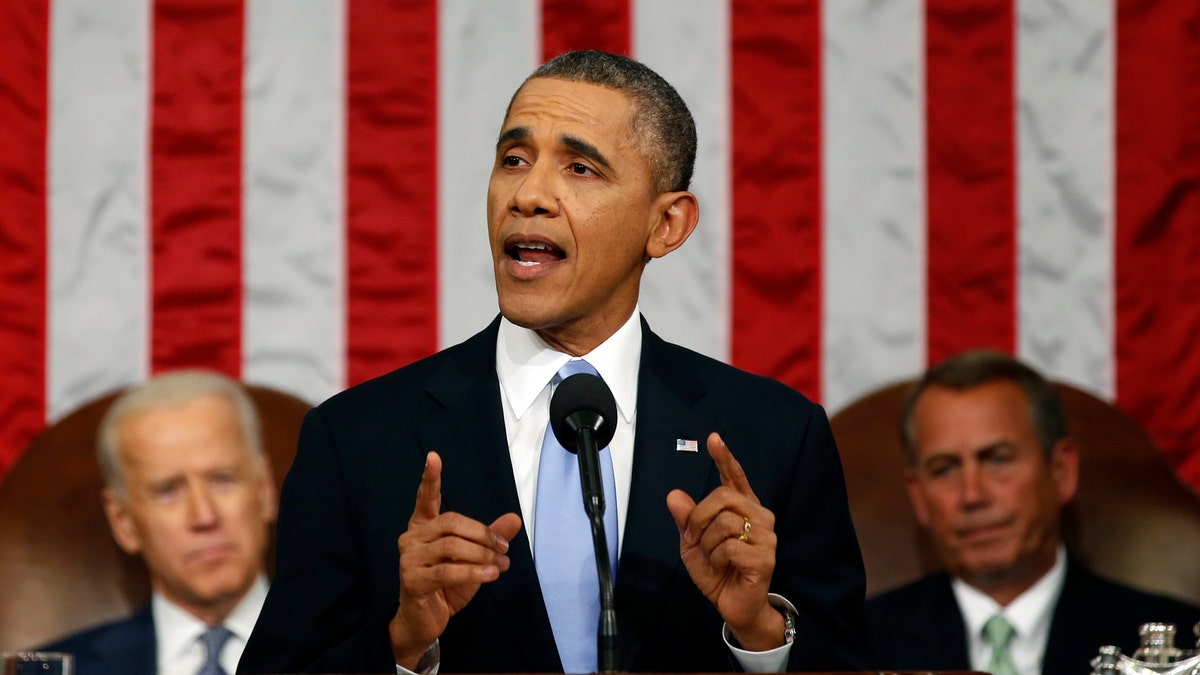
President Barack Obama delivers the State of Union address before a joint session of Congress in the House chamber Tuesday, Jan. 28, 2014, in Washington, as Vice President Joe Biden, and House Speaker John Boehner of Ohio, listen. (AP Photo/Larry Downing, Pool) (AP2014)
A year ago today President Obama stood in the gym of Del Sol High School in Las Vegas, Nevada and laid out a four part plan to overhaul America’s antiquated, unworkable immigration system. The president focused on continuing to strengthen border security, cracking down on employers that hire unauthorized workers, creating a path to earned citizenship and streamlining our legal immigration system. Less than six months later Democrats and Republicans in the U.S. Senate, after lengthy negotiations, hammered out and passed a bipartisan comprehensive immigration reform bill. The legislation was far from perfect, but it provided the House of Representatives with a “working draft” to improve upon.
Or not.
As we entered the final months of 2013 amid a chorus of impassioned pleas from a broad coalition of labor, business, and religious groups, including demonstrations against the continued deportations and an historic “Fast for Families” on the National Mall, the House leadership failed to put immigration reform on the legislative agenda. Instead, the Nation was treated to a litany of lame excuses why the House could not vote on immigration reform including – my personal favorite – that the legislative calendar was too full (of course the legislative calendar was not a problem in 2005 when the House took only three days to consider and pass H.R. 4437, an infamous bill aimed at making millions of Latino immigrants into felons).
Mr. Obama, in 121 words, put the onus squarely on the shoulders of the House GOP by reminding them that immigration is essential to economic growth and job creation—something all Americans, regardless of party affiliation, are concerned about.
So, it was nothing less than shocking Tuesday night that the President entered the House chamber to give the 2014 State of the Union address and not a single immigration reform bill has been put to a vote on the House floor.
Is it any wonder President Obama devoted only 30 seconds of his speech to immigration reform? It clearly wasn’t because an overhaul is not a priority for the President — to the contrary, immigration reform is at the top of the administration’s 2014 legislative agenda. Rather, strategy seemed to dictate that Mr. Obama soft-pedal immigration in his address, to give the House GOP one last chance to act. Nevertheless, Mr. Obama, in 121 words, put the onus squarely on the shoulders of the House GOP by reminding them that immigration is essential to economic growth and job creation—something all Americans, regardless of party affiliation, are concerned about.
It’s also true that Mr. Obama has already said what he is going to say about immigration reform. In addition to presenting his core reform principles a year ago, he has expressed strong support for the bipartisan Senate bill, and implored the House to pass an immigration reform —whether as a comprehensive package or in pieces. And he has done so with the full support of the American people –Republicans, Democrats and Independents – who support immigration reform, including a path to earned citizenship for unauthorized immigrants.
To be sure some immigration advocates were disappointed that when Mr. Obama told Congress he would not hesitate to use his executive authority to “expand more opportunities for American families” he was not referring to immigration reform. As the House delays fixing the broken system, 1,100 immigrants are deported every day, tearing apart thousands of American families each year. The President and the Congress have a shared responsibility to end this tragedy.
The real drama will unfold later this week when the GOP House leadership releases its Statement of Principles on immigration reform. Here is what we are waiting to find out: Is Speaker John Boehner (R-OH) and the House leadership ready to stop dithering and get serious about reforming the badly broken immigration system? Or will they continue to kowtow to the extremists in their party by including unattainable benchmarks and conditions? Will the GOP Statement of Principles recognize that all credible economic studies – from the right-leaning CATO Institute to the left-leaning Center for American Progress – demonstrate that immigration reform, including a path to earned citizenship, will boost the U.S. economy, increase America’s global edge, and create jobs for U.S. workers? Will the GOP principles reflect that the current legal immigration system, an outdated bureaucratic process designed to fit the needs of America in the 1960s, cannot serve American families and businesses in the 21st century? Will the Republicans show they understand that the so-called “legal immigration line” is, in reality, a twisted path that often leads to nowhere? And, perhaps most importantly, will the House leadership support legalization with a path to earned citizenship for all aspiring Americans? Or will they offer a proposal that, for the first time in American history, creates a subclass of immigrants shut off from the American Dream?
The time for Republican excuses is long past. It’s now time for action.







































